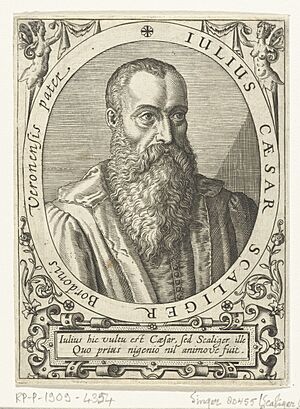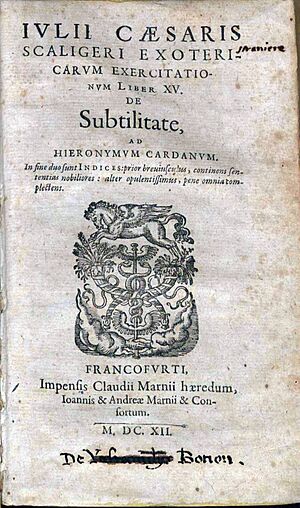Julius Caesar Scaliger facts for kids
Julius Caesar Scaliger (born April 23, 1484 – died October 21, 1558), also known as Giulio Cesare della Scala, was an Italian scholar and doctor. He spent a big part of his life working in France. Scaliger used older ideas from the Renaissance to support the teachings of Aristotle. He argued against newer ways of thinking. Even though he was known for being argumentative, people respected him greatly during his time. A famous writer, Jacques Auguste de Thou, even said that no one from ancient times was better than Scaliger, and he had no equal in his own era.
Contents
About Julius Caesar Scaliger
Scaliger's father, Benedetto Bordone, was an artist who made small paintings and decorated books. In his younger years, Scaliger was known by his father's name, Bordone. However, he later insisted that he was from the noble family of La Scala, who had ruled Verona for 150 years. He was born in Padua, Italy, on August 23, 1484. His son later claimed he was born at the Rocca di Riva, near Lake Garda.
There are two main stories about his early life: the one he told himself and the one told by people who disagreed with him.
Scaliger's Own Story
When Scaliger was twelve, his relative, Emperor Maximilian, made him a page (a young helper). He worked for the emperor for seventeen years. During this time, he became known as a brave soldier and captain. He also studied art with the famous artist Albrecht Dürer.
In 1512, at the Battle of Ravenna, his father and older brother were killed. Scaliger fought bravely, and for his actions, he received a special award called the Order of the Golden Spur.
After leaving the emperor's service, he worked briefly for another relative, the duke of Ferrara. He then decided to stop being a soldier. In 1514, he became a student at the University of Bologna. He thought about becoming a cardinal and then even the pope. His goal was to take back his family's land in Verona from the Venetians. He soon changed his mind about this plan but stayed at the university until 1519.
For the next six years, he lived at the castle of Vico Nuovo in Piedmont. He was a guest of the Della Rovere family. At first, he spent his summers on military trips and his winters studying. He focused mainly on medicine and natural history. However, a serious illness called gout ended his military career.
From then on, he dedicated his life entirely to studying. In 1525, he moved to the city of Agen in France. He went there as the doctor for Antonio della Rovera, who was the bishop of Agen.
Another View of His Early Life
It was only after Scaliger died that his son's enemies claimed he was not from the noble La Scala family. They said he was actually the son of Benedetto Bordone, a book artist or school teacher from Verona. They also claimed he studied in Padua and earned a degree as a doctor there. According to them, the story he told about his life before coming to Agen was made up. There is no proof for his own story other than his statements, and some parts of it don't match known facts.
Life in Agen
Scaliger spent the last thirty-two years of his life almost entirely in Agen. When he died in 1558, he was highly respected for his scientific and literary work. However, his books did cause some arguments. In 1538, he faced accusations, but he was found innocent. One of the judges was his friend, Arnoul Le Ferron.
Scaliger's Important Works
In 1531, Scaliger published his first speech against Erasmus. In this speech, he defended the Roman writer Cicero and those who followed his style. He called Erasmus a "literary parasite" who only corrected texts. This work was known for its strong arguments and excellent Latin. Some people felt it missed the main point of Erasmus's work. Erasmus did not reply, thinking it was written by a personal enemy. Scaliger then wrote a second speech, published in 1536, which was also full of strong criticism.
After these speeches, he published many Latin poems between 1533 and 1547. These poems were printed many times, but later critics did not like them as much. He also wrote a short book about comic poetry and a major work called De causis linguae Latinae (published in 1540). In this book, he looked closely at Cicero's writing style. He also pointed out 634 mistakes made by earlier scholars. This book is considered one of the first Latin grammar books to use scientific methods. He did not publish other purely literary works during his lifetime.
His most famous literary work, Poetices libri septem ("Seven books on Poetics"), was published after his death in 1561. This book contained many unusual ideas and some personal dislikes. However, it also offered sharp observations based on Aristotle's Poetics. Scaliger called Aristotle "our Emperor, dictator forever of all good qualities in the arts." This book became very important in the history of literary criticism. Like many people of his time, Scaliger thought the Roman poet Virgil was better than the Greek poet Homer. His praise for the plays of Seneca over those of the Greeks influenced famous writers like Shakespeare and Pierre Corneille.
Scaliger wanted to be known mostly as a philosopher and a scientist. He saw studying classical texts as a way to relax. He was known for being very observant and having an amazing memory. All his scientific writings were in the form of commentaries (explanations of other works). He felt that most of his scientific works were not ready for publishing until he was seventy years old. In 1556, he published his Dialogue on the book De plantis, which was thought to be by Aristotle. In 1557, he published his Exotericarum exercitationum ("Exoteric Exercises") about Gerolamo Cardano's book De Subtilitate. His other scientific works, which were commentaries on Theophrastus' De causis plantarum and Aristotle's History of Animals, were not fully finished. They were printed after he died.
His work does not show signs of the scientific method we know today, which uses careful observation to form theories. Unlike his fellow scientist Konrad von Gesner, Scaliger's plant studies did not lead him to create a natural way to classify plants. He also did not accept the discoveries of Copernicus about the solar system. He followed Aristotle in his ideas about the world and nature, and Galen in medicine. However, he did not follow them without thinking for himself.
Scaliger is best known for his critical book Exotericarum Exercitationes on Cardan's De Subtilitate (1557). This book discussed natural philosophy and was popular for a long time. The Exercitationes showed his vast knowledge and careful observations. However, they were not perfect. This work influenced many natural historians, philosophers, and scientists like Lipsius, Francis Bacon, Gottfried Wilhelm Leibniz, and Johannes Kepler. Some scholars said that Scaliger seemed to want to disagree with everything Cardan said and agree with everything Cardan disagreed with. Yet, Leibniz and Sir William Hamilton considered him the best modern expert on Aristotle's ideas about physics and the nature of reality.
Important Editions
Scaliger's Family Life
A few days after arriving in Agen, Scaliger met and fell in love with Andiette de Roques Lobejac, an orphan who was thirteen years old. She was a distant relative of a noble family, the Rochepozay, who were friends with Jacques Auguste de Thou, one of Scaliger's close supporters. Andiette's friends did not want her to marry him because he was not yet famous. By 1528, he was a successful doctor. At forty-five years old, he married Andiette, who was then sixteen. Their marriage lasted for twenty-nine years, and they had fifteen children, including the famous scholar Joseph Justus Scaliger.
Honors and Legacy
In 1829, a botanist named Augustin Pyramus de Candolle named a genus of flowering plants Scaligeria in Julius Caesar Scaliger's honor. These plants are found in Europe and Asia and belong to the carrot family.
See also
- Distichs of Cato
 | Lonnie Johnson |
 | Granville Woods |
 | Lewis Howard Latimer |
 | James West |



